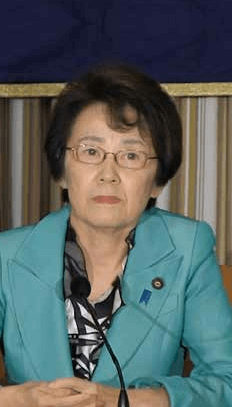Issue:

A controversial government minister comes to the Club to make her case but the journalists in the audience have other ideas.
IF ERIKO YAMATANI ARRIVED at the FCCJ thinking that she would be fielding the sort of softball queries she usually faces from kisha kurabu correspondents covering the issue of Japanese nationals abducted by North Korea, she was very quickly disabused of that notion. As soon as the question and answer session began, the focus of the Sept. 25 press conference switched to her knowledge of and support for Zaitokukai, an ultra right group infamous for its hate speech demonstrations against Korean residents of Japan, and to her relationship with Shigeo Masuki, a former senior official of the group.
Yamatani’s efforts to defect the questions with a disarming smile, combined with her nonchalant dismissal of a Shukan Bunshun story in which she claimed not to be aware that Masuki was involved with Zaitokukai, despite an accompanying photo of the politician with Masuki failed to dissuade the foreign press from its line of questioning. She did, however, pointedly thank a Japanese journalist from NHK for giving her a brief respite by asking her about upcoming negotiations with North Korea about the fates of the missing Japanese nationals.
It had all started so well for the minister, appointed by Prime Minister Shinzo Abe in his cabinet reshuffle in early September to a position that also encompasses the National Public Safety Commission and oversees the activities of the police. In her opening comments, Yamatani had underlined her long track record of trying to secure the freedom of Japanese nationals abducted by North Korea and to protect human rights.
She was a speaker at a United Nations symposium earlier in September and demanded that Pyongyang be held accountable for its human rights abuses. “We believe there is increasing attention being focused on this topic around the world and we want to take advantage of that momentum,” Yamatani added.
She also held aloft a large picture of Megumi Yokota, abducted in November 1977 at the age of 13, and insisted that the Japanese government would continue to put pressure on North Korea to “ensure a comprehensive resolution to this issue.”
Yamatani probably wished she had devoted more time to her presentation than to answering questions from the press, with Richard Lloyd Parry of the Times first up to ask her how long she had known Masuki, how many times she had met the former Zaitokukai official and whether she would be willing to “reject unconditionally the organization, the policies and sentiments which it represents.”
“My electoral district is basically the entire nation and, as a result, I travel throughout the country and I meet many people,” Yamatani said. “I did not know that Mr. Masuki is related to the Zaitokukai organization.”
Asked when she first met Masuki and how many times they have met, Yamatani claimed she has “no specific memory” of when or how many times she has met him. Avoiding a condemnation of the Zaitokukai, she said, “I do not believe it is appropriate to make specific comments about different organizations.”
Pressed on the point by Jake Adelstein, who pointed out that hate speech has been identified by the United Nations, the U.S. State Department and Japan’s National Police Agency which Yamatani heads as an issue that Japan needs to address, the minister claimed that “wa” is of great importance in Japanese society. “Japan has a long history of placing great value on the idea of wa, or ‘harmony,’” she said. “Japan has a long history of respecting the human rights of every single individual.”
Suggesting that groups that are behind hate speech that encourages discrimination “cannot be tolerated,” Yamatani added that any illegal activities should be subject to “the appropriate procedures” by the police and the courts. Responding to a question about the right wing attacks on Japan’s liberal media, primarily the Asahi Shimbun, and the suggestion that the government is encouraging that hounding of the left of center media, Yamatani insisted that “freedom of the press very much exists in Japan.”
One of the oddest answers was to a question by a TBS radio reporter who asked the minister about a previous written reply she had given to the broadcaster. According to the reporter, when asked what kind of organization she thought the Zaitokukai was, she had replied that it was trying to heighten awareness of the “special privileges” that Koreans receive. When he asked what special privileges she was referring to, Yamatani dodged the question by admitting to the reporter that her answer probably consisted of copy taken directly from the Zaitokukai website.
A rather stunning admission, but with time running short at the end of the press conference, and Yamatani clearly keen to get to her next appointment, she declined to reply to some follow up questions concerning Japan’s international reputation should the government, and Yamatani in particular, continue to face questions about protecting the human rights of foreign residents of Japan.
Asked when she first met Masuki, she claimed she has “no specific memory”
She also failed to reply to a query suggesting that, in her position as a senior member of the government, she should have been aware of the policies and attitudes of Zaitokukai and that the failure to do so should have been sufficient for her to tender her resignation.
Julian Ryall is the Japan correspondent for the Daily Telegraph.

